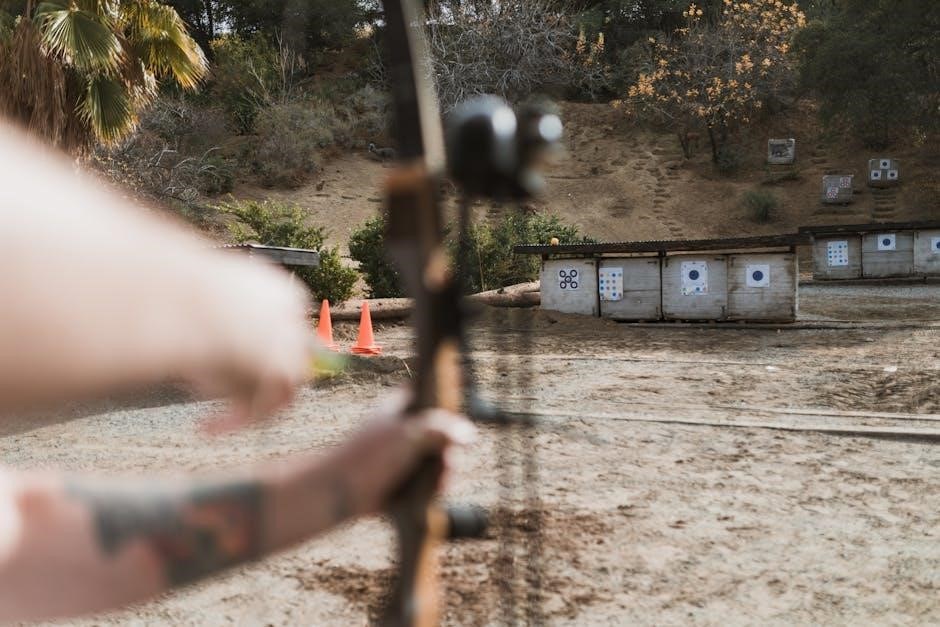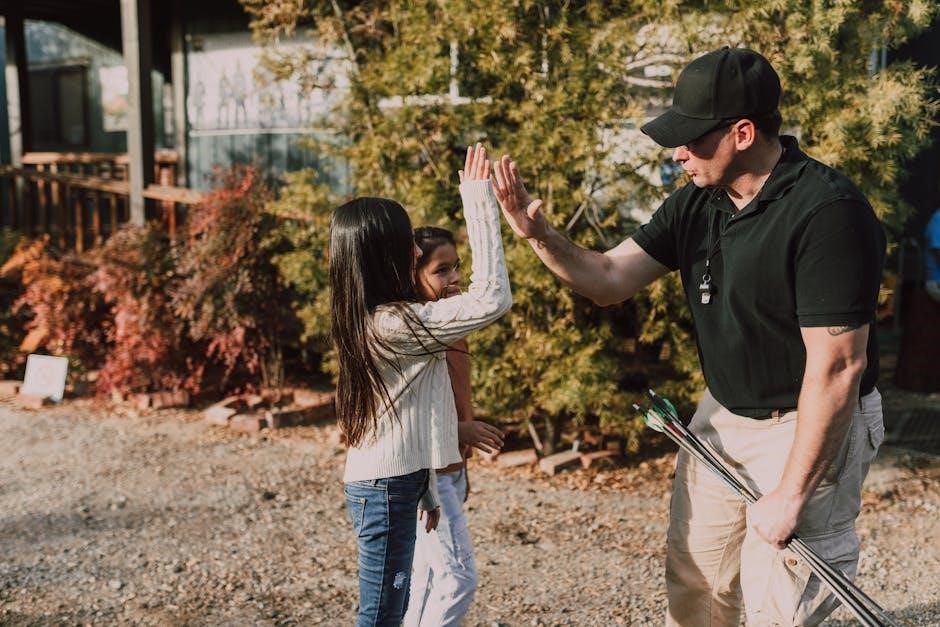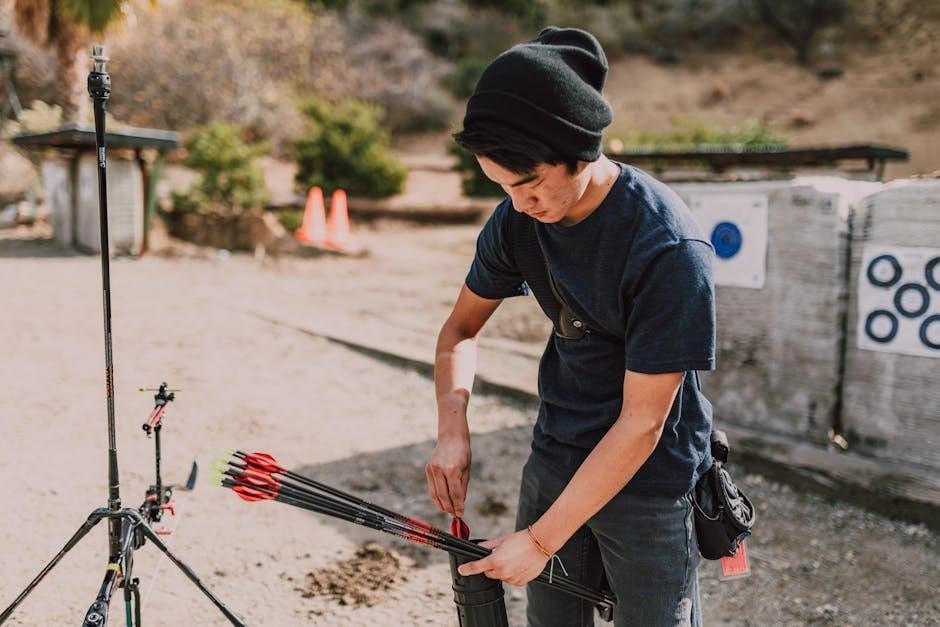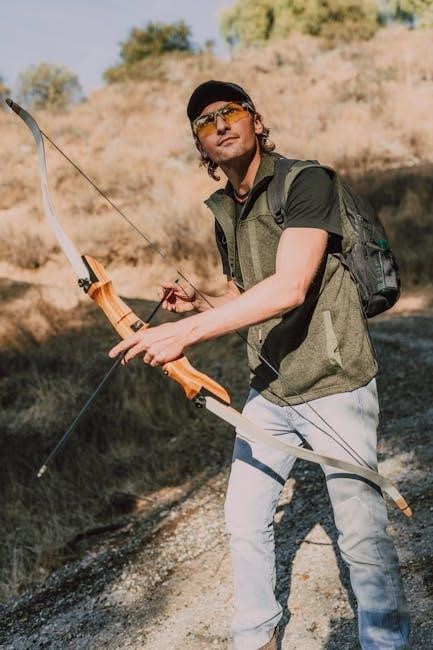How to Become a Hunting Guide
Becoming a hunting guide requires extensive knowledge‚ certifications‚ and hands-on experience.
It involves mastering wildlife behavior‚ safety protocols‚ and client relations while staying updated on regulations.
Becoming a hunting guide is a rewarding career for outdoor enthusiasts passionate about wildlife and conservation.
It demands deep knowledge of ecosystems‚ hunting techniques‚ and safety protocols while ensuring memorable experiences for clients.
This role combines physical stamina‚ mental focus‚ and strong interpersonal skills‚ making it both challenging and fulfilling.

Gaining Necessary Experience and Knowledge
Gaining hands-on experience and in-depth knowledge is crucial for aspiring hunting guides.
This involves understanding wildlife behavior‚ habitats‚ and survival skills while developing expertise in hunting techniques and safety protocols.
2.1. Understanding Wildlife Behavior and Habitat
Understanding wildlife behavior and habitat is essential for hunting guides.
This involves studying animal migration patterns‚ feeding habits‚ and breeding seasons.
Recognizing tracks‚ signs‚ and calls helps locate game effectively.
Knowledge of diverse terrains and ecosystems ensures guides can navigate and predict animal movements.
This expertise enhances hunting success and client satisfaction.
2.2. Developing Survival and Navigation Skills
Mastering survival and navigation skills is crucial for hunting guides.
This includes map reading‚ compass use‚ and GPS navigation.
Guides must know how to build shelters‚ start fires‚ and find water in remote areas.
First aid training is also vital to handle emergencies.
These skills ensure safety and confidence in wilderness environments‚ enhancing the overall hunting experience for clients.
Obtaining Certifications and Licenses
Obtaining necessary certifications and licenses is essential for becoming a hunting guide.
These credentials ensure compliance with regulations and demonstrate professional competence to clients and authorities alike.
3.1. Required Certifications for Hunting Guides
Obtaining certifications such as first aid‚ CPR‚ and firearms safety is crucial.
Many states require guides to complete specific training programs and pass exams.
Certifications often include wildlife conservation and outdoor survival skills.
These credentials ensure guides are qualified and capable of leading safe and successful hunting expeditions.
3.2. State and Federal Licensing Requirements
Each state mandates specific licenses to operate as a hunting guide.
Federal requirements may include permits for guiding on public lands.
Background checks and liability insurance are often necessary.
Guides must comply with both state and federal hunting regulations to ensure legal operation.
Licensing ensures accountability and adherence to conservation efforts.
Building a Professional Network
Networking with experienced guides and outdoor professionals is crucial.
Building relationships fosters mentorship and business opportunities.
A strong network enhances credibility and client referrals;
4.1. Importance of Mentorship in the Field
Mentorship is vital for aspiring hunting guides‚ offering practical knowledge and insights from experienced professionals.
It helps develop critical skills like tracking‚ navigation‚ and client management‚ while providing hands-on training to enhance safety and efficiency in the field.
4.2. Joining Professional Associations
Joining professional associations connects you with experienced guides and provides access to resources‚ training‚ and networking opportunities.
These organizations often offer certifications‚ workshops‚ and updates on industry standards‚ helping you build credibility and stay informed about best practices in the field.
Membership can also open doors to mentorship and business opportunities‚ enhancing your career as a hunting guide.
Marketing and Client Acquisition
Effective marketing and client acquisition involve creating a strong online presence‚ utilizing social media‚ and implementing targeted strategies to attract and retain clients.
Professional branding and SEO optimization are key.
5.1. Creating a Strong Online Presence
Building a professional website and leveraging social media platforms are crucial for attracting clients.
High-quality images‚ testimonials‚ and detailed service descriptions enhance credibility.
SEO optimization ensures visibility in search results‚ while consistent content updates keep audiences engaged.
Utilizing online directories and forums can further expand your reach and reputation.
5.2. Effective Strategies for Attracting Clients
Offering personalized hunting packages and promotions attracts diverse clients.
Engaging with hunting communities and forums builds trust.
Word-of-mouth referrals and partnerships with outdoor gear companies enhance credibility.
Providing exceptional customer service ensures repeat business and positive reviews.
Tailoring experiences to client preferences fosters loyalty and long-term relationships.
Safety and Risk Management
- Conduct thorough safety briefings for clients before hunts.
- Carry emergency communication devices and first aid kits.
- Assess terrain risks to prevent accidents.
- Develop contingency plans for emergencies.
6.1. Ensuring Client Safety During Hunts
- Conduct thorough safety briefings to educate clients on firearms‚ terrain‚ and wildlife.
- Monitor weather conditions to avoid hazardous situations.
- Ensure clients wear appropriate safety gear.
- Stay alert for potential risks and intervene promptly.
- Carry first aid kits and emergency communication devices.
6.2. Managing Risks and Emergencies
Assess potential hazards beforehand and develop emergency response plans.
Carry communication devices for quick assistance and know evacuation routes.
Provide first aid training and maintain emergency kits.
Document incidents and report them to authorities.
Ensure liability insurance covers unexpected events.
Educate clients on emergency protocols to ensure preparedness.

Equipment and Gear Selection
Selecting the right gear is crucial for a successful hunting experience.
Invest in durable‚ high-quality firearms‚ optics‚ and survival tools.
Ensure equipment suits various hunting environments and client needs.
7.1. Essential Gear for Hunting Guides
Hunting guides need reliable gear to ensure safety and efficiency.
Essential items include high-quality rifles‚ scopes‚ binoculars‚ and survival tools.
Durable apparel‚ GPS devices‚ and first aid kits are also vital.
Proper equipment helps guides navigate challenging terrain and handle emergencies effectively.
7.2. Maintaining and Upgrading Equipment
Regular maintenance is crucial for reliability and safety.
Clean and inspect gear after each use‚ replacing worn or damaged parts.
Stay updated with advancements in technology and materials.
Invest in quality upgrades to enhance performance and durability.
Proper storage and organization ensure equipment remains in optimal condition for future hunts.
Understanding Local Regulations and Laws
Understand and comply with local‚ state‚ and federal hunting regulations.
Familiarize yourself with licensing requirements‚ permits‚ and seasonal restrictions.
Stay informed about updates to ensure legal and ethical guiding practices.
8.1. Familiarizing Yourself with Hunting Laws
Understanding hunting laws is crucial for guides. Research state and federal regulations‚ including licensing requirements‚ permits‚ and bag limits. Stay updated on seasonal restrictions and legal hunting hours. Familiarize yourself with protected species and prohibited methods. Ensure compliance with firearms and equipment regulations. Regularly check for updates to avoid legal issues and maintain ethical practices. This knowledge is essential for responsible guiding.
8.2. Obtaining Necessary Permits
Securing permits is essential for hunting guides. Obtain a commercial guiding permit from state wildlife agencies. Additional permits may be required for specific species or hunting methods. Ensure all licenses are up-to-date and valid for the regions you operate in. Failure to comply can result in legal consequences. Research and verify permit requirements before leading hunts to avoid penalties and ensure smooth operations.

Developing Customer Service Skills
Strong customer service skills are crucial for success. Focus on clear communication‚ patience‚ and problem-solving to ensure a positive experience for clients‚ fostering trust and loyalty.
9.1. Communication and Client Relations
Effective communication is key to building strong client relationships. Guides must listen actively‚ provide clear instructions‚ and adapt to client needs‚ ensuring a positive and memorable hunting experience.
This fosters trust and satisfaction‚ leading to repeat business and referrals. Clear communication helps manage expectations and enhances overall client satisfaction throughout the hunt.
9.2. Ensuring a Positive Client Experience
A positive client experience hinges on attention to detail and professionalism. Guides should tailor hunts to client preferences‚ provide expert guidance‚ and ensure safety.
Small gestures like sharing knowledge about wildlife and habitat can enhance satisfaction. Creating memorable moments fosters loyalty and encourages referrals‚ making client experience a cornerstone of a successful guiding career.

Business and Financial Management
Establishing a business structure and managing finances effectively is crucial. Guides must set pricing‚ track expenses‚ and plan for future growth to maintain profitability and sustainability.
10.1. Setting Up a Business Structure
Creating a business structure is essential for professionalism and legal compliance. Guides often form LLCs or sole proprietorships to protect assets and manage taxes effectively. Registering the business ensures credibility and access to necessary permits. A clear structure also helps in organizing operations‚ client contracts‚ and financial records‚ ensuring smooth day-to-day management and scalability for future growth.
10.2. Managing Finances and Pricing Services
Effective financial management ensures long-term success. Guides must track income‚ expenses‚ and taxes meticulously. Pricing services competitively while covering costs is crucial. Consider variable costs like gear‚ permits‚ and fuel when setting rates. Offering packages or discounts can attract clients‚ but profitability must remain a priority to sustain the business and allow for future investments and growth opportunities.
Continuous Learning and Improvement
Continuous learning is essential for staying updated on industry trends and adapting strategies. Pursuing advanced training ensures guides remain competitive and knowledgeable in their field.
11.1. Staying Updated on Industry Trends
Staying updated on industry trends is crucial for hunting guides to adapt to changing regulations‚ technologies‚ and client preferences. Engaging with industry publications‚ online forums‚ and social media helps guides stay informed. Attending workshops and seminars also provides insights into new strategies and tools. Networking with experienced professionals offers valuable perspectives and keeps guides aligned with current best practices and standards in the field.
11.2. Pursuing Advanced Training
Pursuing advanced training enhances a hunting guide’s expertise and credibility. Certifications in wilderness first aid‚ wildlife management‚ and specialized hunting techniques are highly valuable. Guides should seek out workshops‚ online courses‚ and hands-on training to refine their skills. Continuous education ensures they stay competitive and provide exceptional services. Advanced training also helps guides adapt to evolving industry demands and client expectations effectively.
Physical and Mental Preparedness
Becoming a hunting guide demands physical stamina for long hours and mental toughness to handle challenges. Guides must build endurance and resilience to thrive in demanding environments.
12.1. Building Physical Stamina
Building physical stamina is crucial for hunting guides‚ as they often navigate rugged terrains and endure long hours. Regular cardiovascular exercises‚ strength training‚ and hiking with gear simulate real-world demands. Guides must prepare their bodies to handle the physical stress of guiding hunts‚ ensuring they can keep up with clients and perform tasks efficiently in challenging conditions.
12.2. Developing Mental Toughness
Mental toughness is essential for hunting guides to handle stress‚ unpredictable weather‚ and high-pressure situations. Guides must cultivate resilience through experience and training‚ staying calm under adversity. Developing a strong mindset ensures they can lead clients safely and make sound decisions‚ even in challenging environments‚ fostering trust and reliability throughout the hunting experience.
Becoming a successful hunting guide demands dedication‚ continuous learning‚ and a passion for the outdoors. With the right mindset and preparation‚ this rewarding career can be achieved.
13.1. Final Thoughts on Becoming a Successful Hunting Guide
Becoming a successful hunting guide requires passion‚ dedication‚ and continuous learning. Mastery of wildlife‚ safety‚ and client relations is essential. Stay adaptable‚ embrace challenges‚ and prioritize ethical practices to build a rewarding career in the outdoors.
